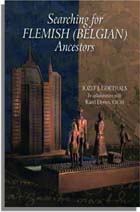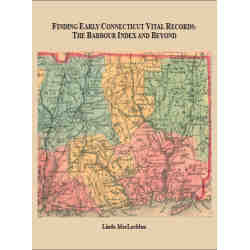Description
Mr. Goethals and Fr. Denys have prepared the first English-language guidebook for tracing Flemish ancestors from Belgium. A primary goal of Searching for Flemish Ancestors is to inform researchers about the Flemish sources that are accessible in the U.S. and how to interpret them.
The book begins with a very informative historical introduction. Readers will learn, for example, that (1) Belgium did not become an independent country until 1830; (2) the area that became Belgium had been a focal point of international power politics for hundreds of years; (3) the inhabitants of Flanders, the northern part of Belgium, constitute 60% of the population, while the remainder are French-speaking and, to a far lesser extent, German-speaking; (4) Flemish emigration to the U.S. began in earnest during the last quarter of the 19th century; and (5) today, there are about 350,000 Americans of Flemish descent, most of whom live in the upper Midwest (Michigan and Wisconsin).
Mr. Goethals’ emphasis, of course, is on Flemish records and methodology. Chapter One focuses on Flemish-American genealogical organizations, such as the Genealogical Society of Flemish Americans (GFSA), the Belgian American Heritage Association, and the Detroit-based newspaper, the “Gazette van Detroit.” As the author points out, many Belgian records have been microfilmed by the LDS Church or are available on the Internet. Chapters Two and Three are devoted to the all-important vital records of the Civil Registry (1796-1900) and Flemish parish registers (1600-1796). Mr. Goethals translates sample records from each category into English from the original Flemish, French, and Latin. He also includes a case study that demonstrates how to work with these records. The final chapter discusses other types of records, such as court records (schepenenbank), orphan records (weezerie), tax lists (penningskohieren), and citizenship records (poorters en buiten-poorters).
Buttressing the text itself are a number of useful appendices. In the first of these, the author gives a brief course on Flemish names and naming practices. If you to travel to Flanders, you will appreciate the appendix that introduces the holdings of the State Archives in Flanders (Rijksarchieven), as well as the names, addresses, and functions of the various Flemish genealogical societies. One of the most important features of the entire volume is the glossary of Flemish, French, and Latin terms commonly used in Belgian genealogical documents. (By the way, many of the same terms will show up in Dutch genealogy because Holland’s native tongue is identical to that of Flanders.) Rounding out this extraordinary guidebook is a bibliography of sources./p>
For persons of Flemish ancestry Searching for Flemish Ancestors will be a godsend.





Reviews
There are no reviews yet.